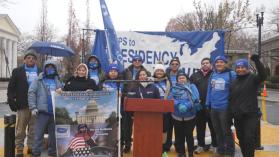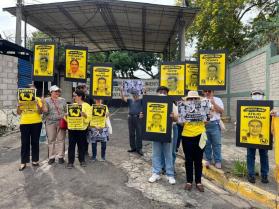Monsignor Romero Beatified amid Calls for Justice
As hundreds of thousands gathered in San Salvador to celebrate the beatification of the city’s former archbishop Monsignor Oscar Arnulfo Romero, social movement and human rights groups demanded his murderers be brought to justice.
The beatification ceremony that took place on Saturday, May 23 marked a requisite step in the process to Catholic Sainthood. While many have long considered the martyred archbishop “Saint Romero of the Americas,” the beatification and canonization processes had been held up by leadership of the Catholic Church for some time due to his association with Liberation Theology and leftist social and political movements in the region. Pope Francis, who himself has criticized capitalism as a system that generates poverty and social exclusion, re-opened Romero’s beatification process, declaring him a martyr who was killed for “hatred of the faith.”
In the days before the ceremony, social movement groups carried out a series of activities to demand justice and an end to impunity for Romero’s brutal murder at the hands of US-trained, paramilitary death squads while giving mass on March 24, 1980. On March 21, a broad coalition of human rights, faith and community groups marched to the Attorney General’s Office to deliver a petition demanding a full investigation and prosecution of the material and intellectual authors of the murder. The next day, groups gathered for a vibrant popular celebration, mass and vigil, enjoying artistic expressions, food and community throughout the night before joining the ceremony early Saturday morning. “[Romero’s] beatification is the Church’s recognition, because the people already knew, but Monseñor Romero’s beatification is not a final point, but rather a starting point,” said José Lazo of the Church of the Poor coalition.
Many criticized the local Catholic leadership, which is notoriously conservative, for calling Romero a “martyr for love” and ignoring his dedication to social justice in the media campaign surrounding the beatification. Luis Monterrosa of the Jesuit Central American University’s Human Rights Institute said Romero wasn’t a martyr for love, but rather a “martyr for hatred of the faith […] we must remember why they killed him, for defending the poor and human rights.”
Leonel Herrera, director of the Participative Community Radio Association (ARPAS), agreed: “We are concerned about the manipulation of the figure of Monseñor Romero, […] those who murdered him rejected his message of social justice, his message of equality, his preferential option for the poor.”
The ceremony was attended by the presidents of Guatemala, Honduras, Ecuador, Panamá, as well as high ranking delegations from Nicaragua, Cuba, Costa Rica, the Dominican Republic, South Africa and others. United States Congressman Jim McGovern also attended, along with the State Department head of Religious Affairs.

 "I am a CISPES supporter because continuing to fight for social justice and a more people-centered country means continuing the dream and sacrifice of thousands of my fellow Salvadorans who died for that vision.” - Padre Carlos, New York City
"I am a CISPES supporter because continuing to fight for social justice and a more people-centered country means continuing the dream and sacrifice of thousands of my fellow Salvadorans who died for that vision.” - Padre Carlos, New York City

